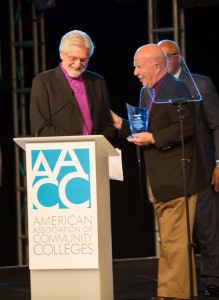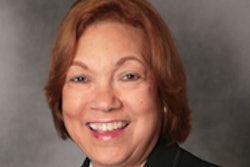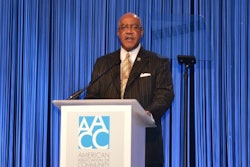 Dr. Terry O’Banion, left, and Dr. John E. Roueche take center stage at the AACC luncheon.
Dr. Terry O’Banion, left, and Dr. John E. Roueche take center stage at the AACC luncheon.CHICAGO — Saying he was “humbled and deeply honored,” Dr. Terry O’Banion accepted the 2016 Diverse Champions Award before a packed ballroom this afternoon during the American Association of Community College Annual Convention’s Hail and Farewell Luncheon.
O’Banion, 79, the award’s fifth recipient, has had a tremendous influence on community colleges and community college leaders over the last 50 years, said Dr. John E. Roueche in introducing O’Banion.
Roueche, who received the inaugural Champions Award, said he suspected that many in the audience were not aware that O’Banion was the architect and first grant writer that resulted in the funding for National Institute Leadership Development (NILD). Created in 1981, NILD has been a vehicle for leadership development for women.
There were only 50 women community college presidents back then, O’Banion said. Today there are 332. “The program provided opportunities for leadership for 6,000 aspiring women. It’s one of the programs I am most proud.”
O’Banion, who is now chair of the graduate faculty at National American University, said that he and Roueche “have been collaborating for over 35 years” on three programs: Expanding Leadership Diversity, Executive Leadership Institute and NILD.
While noting that much progress has been made in expanding leadership opportunities, O’Banion told the audience: “We are still far from the goal of full equity for women and minorities in community colleges. We leave it to you to fulfill the goals of full equity for our colleagues. We ask you one thing: Please don’t take 35 years to do that.”





















